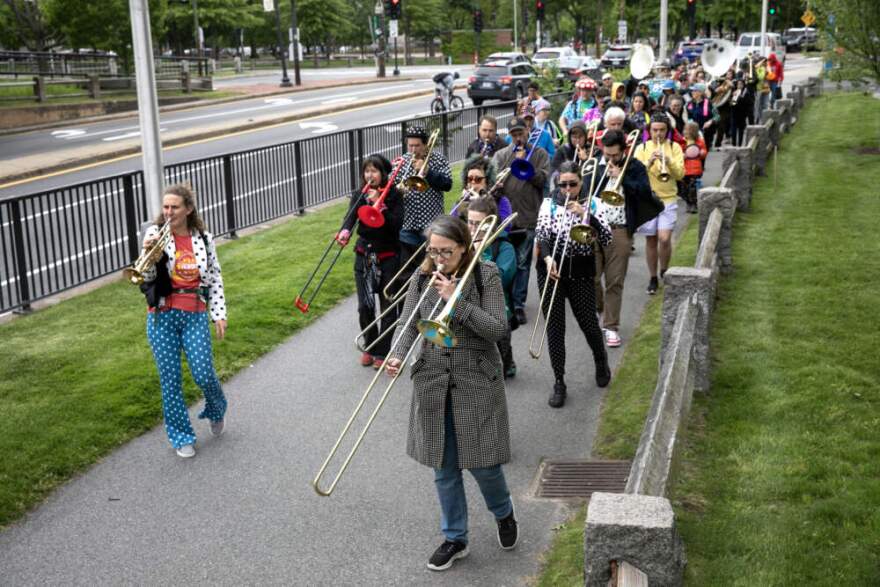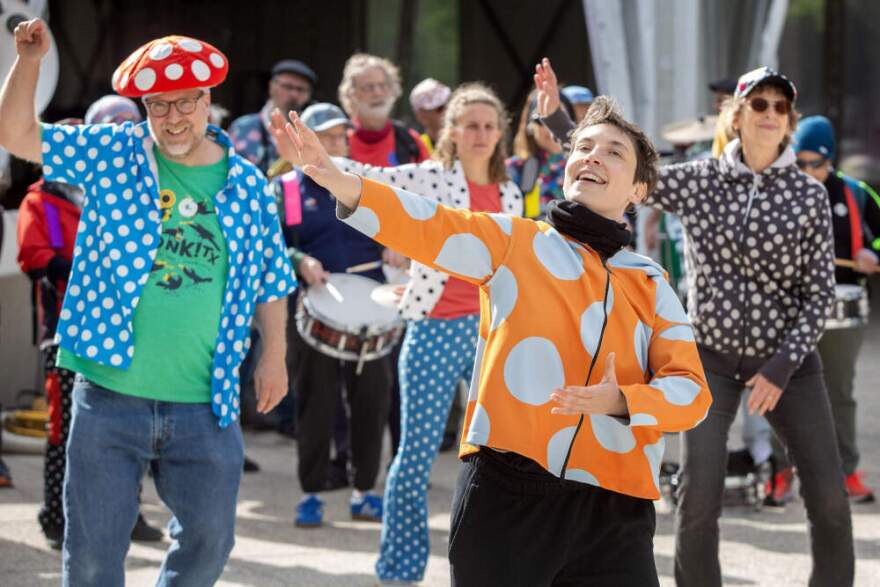On a Sunday in April, Cambridge Common reverberated with the discordant honks and trills of a brass band warming up. Musicians arrived at the park with instrument cases strapped to their backs and slung over their shoulders, or rummaged through a bin full of trombones set out on the ground. Someone tooted serenely on a sousaphone painted with polkadots.
Polkadots are the official uniform for School of Honk, a community brass band that takes a radically inclusive approach to music education. Even on an unseasonably chilly spring day, around 80 people of all ages showed up to the band’s weekly practice.
The group circled up. Dana Gauthier, one of several volunteers in charge, explained the schedule for the afternoon and offered some ground rules for the uninitiated.
“The goal of School of Honk is to have fun,” Gauthier declared. “One way to have some fun is to not worry about wrong notes.”
Next, the group ran through a couple songs — “Stay Human” by Jon Batiste and “Tightrope” by Janelle Monae — and split into sections by instrument. The freshest recruits were assigned “newcomer buddies” for one-on-one attention.
Over with the drums, George Zollinger offered some pointers to a new School of Honk member named Elliet Fisher. Zollinger wore a puffy red-and-white polka-dotted hat that looked like a toadstool mushroom.
“So you’re basically trying to hit the rivet,” Zollinger explained. “And you’re stick’s about a third of the way in.” He gave the edge of the drum a crisp thwack.

It was Fisher’s first time trying drums. It’s not uncommon for people to show up at School of Honk and pick up an instrument they’ve never touched before. Mike Ames, of Lexington, began his brass instrument journey when, after seeing brass bands play in New Orleans, he searched for something similar in Boston.
“School of Honk came up, and I’m reading the description and I’m like, ‘Well, this is a little weird,’” Ames recalled. But he went to see the band perform anyway. “The guy at the back of the parade said, ‘Oh, you can join this band.’ … And so I went, like, the next week.”
By the end of that first practice, Ames found himself marching along in the very same parade he had watched as a spectator, gamely trying to follow along on a green plastic trombone.
Every School of Honk practice ends with a parade. That way, even the most inexperienced musicians get to perform. There is a dance troupe, too, so that non-musicians and even bystanders can join in. School of Honk accepts all comers, but it is especially geared toward people who may be new to music entirely.
“We start with lively, lovable songs that are arranged in such a way that someone could play just a very simple, but very important part to that song,” explained Kevin Leppmann, the executive director of School of Honk.

Leppmann founded School of Honk 10 years ago. A trombone player, he had been involved in the founding of HONK! Festival of Activist Street Bands, a popular event in which brass and street bands from all over the world converge for one October weekend in Somerville’s Davis Square. Leppmann wanted a way to continue the fun beyond the festival itself.
“The idea was to start a community, a school, that would recreate what was happening at the HONK! Festival, every Sunday afternoon,” Leppman said.
From the start, Leppmann designed School of Honk as an antidote to traditional music education. He noticed that kids who struggle to easily master an instrument often decide music just isn’t for them. They carry that belief into adulthood, which makes it even harder to pick up an instrument later on in life.
“Our society in general really evokes this notion that the best music is music that’s performed by professionals, people who have been training all their lives to make music,” Leppmann said. “And the role of everyone else is to consume it … passively.”
Leppmann wants to model a different relationship to music, one unconcerned with perfection and more attuned to music’s ability to foster community.
“We’re trying to do something very different with it,” Leppman explained. “Which is to get people not just to express themselves and realize a piece of themselves, but to see that expression in others and form a connection with other people.”
The strategy seems to be working. Attendance at weekly practices remains high, and School of Honk now offers a summer camp session for musicians age 10 and up. The group plans to raise money to secure a permanent rehearsal space in the near future.

For many School of Honk members, the band represents a chance to rewrite the story they’ve long told themselves about their innate musical abilities.
“ I had played trumpet in middle school for like one year, and I didn’t like it,” said School of Honk member Megan McLaughlin. “I wasn’t good at music, I didn’t like reading the music. And I just quit.”
A friend convinced her to come to a School of Honk practice. McLaughlin again picked up the trumpet, and again struggled. This time, she stuck with it.
“ The first time I came, they played ‘Video Killed the Radio Star,’ and in the middle they do a trumpet solo,” McLaughlin recalled. “I was like, ‘One day, I am doing that.'”
Nearly 10 years later, she has taken more trumpet solos than she can count.
At the end of the April practice, School of Honk set off down Mass Ave., a river of polkadots stretching most of a city block. Fisher, the new drum recruit, marched along with his newcomer buddy, Zollinger. At one point, Fisher made a very audible mistake, and the two burst into laughter.
Zollinger reassured him. “You did it, though,” he said, as the band cranked back up.
This article was originally published on WBUR.org.
Copyright 2025 WBUR




